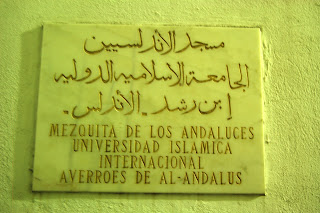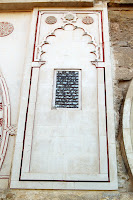The journey then moved to Cordoba, a small town which gaining its reputation as the biggest city in Europe after Vatican city with 600,000 population. And due to its strategic location, Tariq bin Ziyad conquered the city in 711. Since then it was ruled by the Muslims until felt to the hands of Crusade Army in 14th century.
The mosque
The main attractions in Cordoba are Mesquita de Cordoba or Mesquita de Cathedral according to the locals and Medinat al Zahra.
On the left is the side entrance of the Mesquita, and on the right is where my conference is held - Palacio de Congresso.
The mezquita from across the river, where underneath the short minaret is the mimbar
Ancient aqueduct
One of the city gates
Inside a Jewish synagogue
Cordoba is appreciating most of ancient philosophers and intellectual, but most of the figures are Jewish.
Mezquita de Cordoba is also popular as Mesquita de Cathedral because it was build on the site of Roman Catholic Church bought from the early citizens of Cordoba. Later, when Muslim were defeated, the Crusades build many chapels inside the mezquita. It was a controversial issue between the town government and the church but the royal decided to side the bishops. Picture on the right shows the main chapel in the middle of the building, while the left is the mimbar. We did check the qiblat and it is in the right direction.
Front entrance to the mezquita (left), some verse from the Quran found embalmed on the wall (right)
Carving of quran verse (left); the mezquita garden (right)
We went to an archaeological site, Medinat al Zahra, a Muslim town built by Khalifah Abd Rahman II and III towards the end of Muslim ruling.
Views at an area which was once a mosque,Medinat Al Zahra (left) and Zara at one of the arches.
Some of side walk-cafe under orange trees.
Cordoba Train Station




















No comments:
Post a Comment